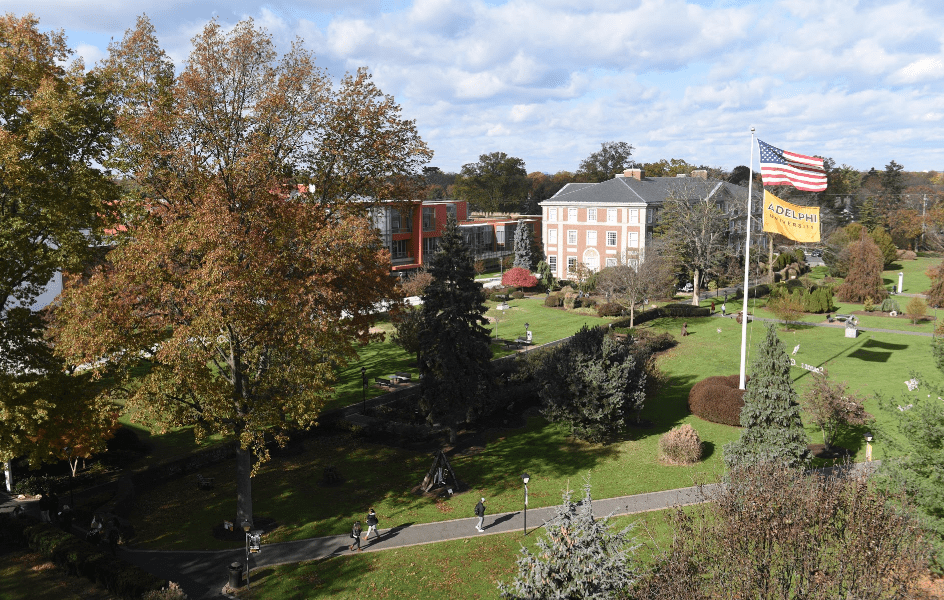Hofstra’s Alan Singer is preparing to teach three courses in the fall via a hybrid learning model. Equipped with cameras and online tools, Singer said, Hofstra’s faculty underwent hours of orientation over the summer to learn how to use Blackboard and other educational software to teach students, even if they can’t attend class in person. He expects that could be his go-to teaching method for a while.
“Having synchronous classes where everybody signs in, I think that will be with us for a long time,” he said.
Singer is a professor of teaching and the director of the social studies education program at Hofstra University. It is one of the colleges in Nassau County that will welcome students back to in-person learning in the next few weeks. Many universities around the county have opted to keep classes online while the country grapples with the COVID-19 pandemic.
About a third of the students in each of Singer’s classes opted to attend classes only online. Those who are in class will have to wear a mask at all times and classrooms will be configured to hold about 30 percent of their normal capacity, according to the school’s website.
Living on campus at Hofstra is going to look different as well. Everyone in a residence hall has to wear a mask and keep a six-foot distance except in his or her own room. Students will not be allowed to visit each other’s rooms, even if they live in the same building. Campus residents will be assigned to use only one sink and shower for the entire semester. Lounges and kitchens will have occupancy limits.
The plan was developed in partnership with Northwell Health.
Singer said his concerns about the coming semester are similar to those that are being echoed all over the country: that young people gathering in close quarters will trigger a local surge in novel coronavirus cases.
“Hofstra is prepared but a lot of it depends on the responsibility of young people to take precautions,” Singer said.
Adelphi University is also going with a hybrid learning approach and will begin classes on Aug. 31. The school broke classes down into categories that have various levels of in-person learning depending on the need to have students meet face to face, according to Kristen Capezza, vice president of communications at Adelphi. Classes that require labs or involve the performing arts will be given more time for in-person interaction. Students may opt to take classes fully online if they wish.
Capezza said all students will take a COVID test before returning to campus and periodic testing will occur on campus. No visitors will be allowed in residence halls and students will be limited to two people to help them move in. Capezza said isolation rooms have been set aside on campus in case a student has to self-isolate.
In the spring, the school converted roughly 1,000 classes to a purely online format in two weeks when the pandemic first broke out. Capezza said the teaching staff has undergone seminars over the summer to improve the quality of online education and is confident they would be able to provide a quality education if the school were forced to convert to distance learning again.
Long Island University Post will begin its semester on Sept. 8 and will use the hybrid model as well.
“Classrooms have been configured to promote social distancing. LIU community members will be required to practice social distancing while on campus, which includes wearing a face covering. Courses that involve performance, laboratory and clinical experiences will take into consideration unique space requirements and ensure that such courses are conducted with proper COVID-19 protocols in place,” the college said in a statement sent to Blank Slate Media.
Move-in dates will be staggered and conducted by appointment to reduce the number of people coming and going at once. Maximum occupancy signs will be placed on buildings and in hallways and bathrooms. Directional signs will be placed to keep walkers moving in one direction.
Long Island University representatives said they have a contingency plan in case they have to convert to fully remote learning at some point.
At Nassau Community College, a spokesperson said that 93 percent of the school’s classes will be conducted remotely and the rest will have some in-person component if the class requires it, such as classes with labs.
Books at the library will be quarantined for four days after being returned. Reserve textbooks will not be available for the fall semester, according to the school’s reopening plan.
The college will not lease campus space for external events “subject to an exception/review process for mission-critical events that can meet physical distancing and other applicable safety standards,” according to the plan.
Classes at SUNY Old Westbury will also occur mostly online in the fall. The school’s plan contains a section on “facilities-dependent courses” that allows for some in-person visits to campus for things like labs, studio sessions and proctored exams. Students can contact the university registrar to see if they will have any campus visits in their course load.
Old Westbury will not offer any on-campus student housing in the fall. Students can work with the Office of Residential Life to secure a refund or credit on their housing deposits. Decisions on which dining facilities will be opened on campus are still being made.
“Students who may need assistance are directed to area affordable housing organizations for assistance,” said Michael Kinane, vice president of communications at SUNY Old Westbury. “Our main goal is to reduce as much as we can the frequency of visits to campus and the overall population density we experience here to lessen the potential for COVID-19 to spread if present.”



